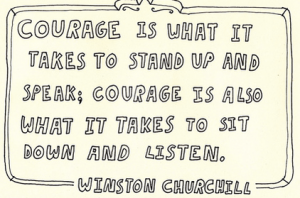In order to build authentic relationships with grassroots organizations, these qualities, attitudes and abilities will really make a difference:
1. Listen actively and openly.
When was the last time you were really listened to? The kind of listening where the other person was not judging or giving advice too quickly and was genuinely interested in what you had to say, without any agenda other than truly wanting to understand and help you?
Really trying (and wanting) to listen can become a deeply rewarding experience and is the quickest way to connect to the humanity in others and ourselves. In-depth listening can be the one of the greatest gifts you can give in working with people in grassroots organizations around the world. We don’t do it enough.
2. Put local ownership first.
A community’s ownership and investment in finding its own solutions to local problems is essential to any chance of sustainability. Grassroots organizations are more likely to be responsive to people’s true needs, mobilize local resources, inspire local ownership, and build community strength in a variety of ways. As outsiders and as donors, we need to be more significantly more mindful of how we undermine local ownership and then…stop doing it!
3. Bring honesty, trustworthiness, integrity… and doubt!
You can build trust through being worthy of trust in all that you do, and undertake to do – honesty, openness and integrity are key. Many organizations or communities have negative experiences of outsiders and, despite the warmth they might display towards you, they may find it very difficult to open up to you.
Being completely honest about what you can and can’t offer may require courage and frankness. Being transparent about your own self-doubts can encourage a new degree of honesty in others.
Sometimes, as resourced outsiders, when we meet with people suffering from deprivation, we create high expectations, in them and in ourselves. Or we feel completely helpless in not being able to offer enough and in so doing may even reinforce others’ feelings of hopelessness.
So what do we do? We don’t come with answers, but if we are to be of any use, it will be because people come to trust us and through honest conversation and support we help people to find their own way forward.
Adapted from: The Barefoot Collective. (2009). The Barefoot Guide to Working with Organizations and Social Change. Cape Town: Community Development Resource Association. Retrieved March 18, 2009, from www.barefootguide.org


Pingback: Real Impact with Saeed Wame | Good Intentions Are Not Enough